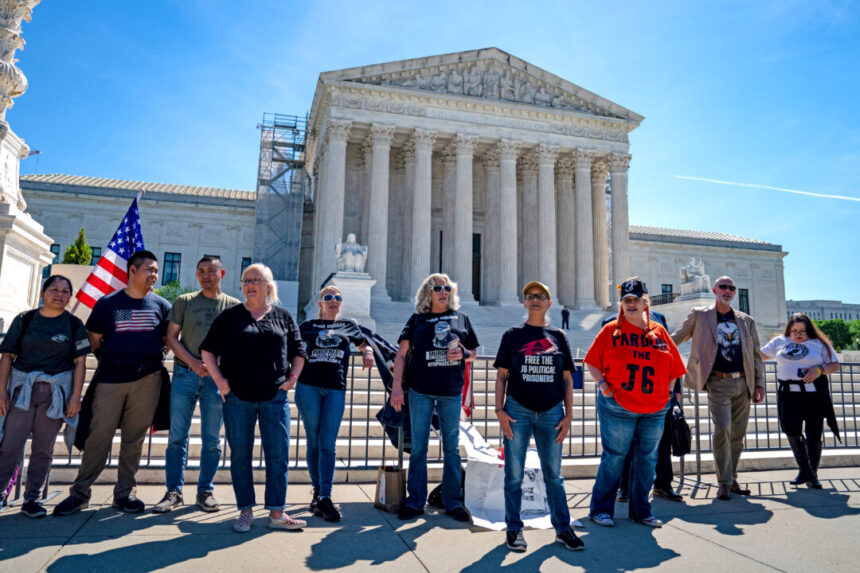Good morning, and welcome to The Epoch Times News Brief for Wednesday, April 17, 2024, and we’re almost there—halfway through the week. I’m Bill Thomas and now, from the Supreme Court to state legislatures, our coverage today spans key legal battles and pivotal legislative changes. A lot to get to, so let’s dive right into our first big story.
We’ll begin with the Supreme Court, where justices are reevaluating the charges against participants of the Jan. 6 Capitol breach. Here’s what’s going on.Conservative justices on the Supreme Court seemed sympathetic toward Joseph Fischer, a former police officer who was charged for entering the U.S. Capitol for four minutes during the events of Jan. 6, 2021. This case is particularly significant because its outcome could impact other Jan. 6-related legal actions, including those against former President Donald Trump.
Mr. Fischer is facing multiple charges, most notably, this one: obstructing an official proceeding—a charge that carries a potential sentence of up to 20 years in prison.
His defense team contends that he should not have been charged under this particular law, which typically relates to tampering with evidence in official proceedings.
Critics, including Mr. Fischer’s defense and some legal experts, have accused the Biden administration of inappropriately using this law to prosecute individuals for exercising their First Amendment rights.
During oral arguments, Mr. Fischer’s lawyer argued that the statute was meant to prevent the destruction of evidence, not to punish broader forms of obstruction of proceedings. The U.S. solicitor general, however, defended the statute’s use as a general catch-all for obstruction. The justices raised concerns about how broadly this statute could be applied, including actions like pulling a fire alarm or protesting outside the Capitol.
The government argues that Mr. Fischer had the intent to disrupt Congress’s function and used violence to intimidate. On the other hand, Mr. Fischer’s attorneys deny that he engaged in any violent acts and assert that he was a victim.
This is a developing story, and we’ll keep you updated as the story continues to unfold.
Up next: a brand new legal development from Manhattan where President Trump faces potential contempt charges.Prosecutors in the “hush-money” case have filed court documents accusing President Trump of violating a gag order by commenting on potential witnesses in the case. This order specifically forbids President Trump from making public comments about witnesses like Michael Cohen and Stormy Daniels.
The violation in question arose from a recent social media post by President Trump, in which he called Mr. Cohen and Ms. Daniels “sleazebags.” Prosecutors have responded by requesting the court fine President Trump $1,000 for each violation of the gag order. They also warned that if President Trump continues to disregard the order, he could face jail time.
The motion led to the scheduling of a court hearing on April 23 to address these allegations.
Previously, Judge Juan Merchan had expanded the scope of the gag order after President Trump criticized the judge’s daughter. President Trump’s lawyers have argued that the gag order infringes on his right to free speech. The trial, which deals with allegations that President Trump falsified company records, is anticipated to last about eight weeks, and the process of selecting a jury could take as long as two weeks.
Moving on now from courtroom battles, we turn our focus to Maine. This piece of news really got people talking on our website, with over 1,000 people chiming in.Janet Mills, the governor of Maine, has decided to let a bill become law that will give the state’s four electoral college votes to the presidential candidate who wins the most popular votes nationwide. Currently, Maine divides its electoral votes between the state’s overall winner and the winners in each congressional district.
This change aligns with the efforts of the “National Popular Vote” group. They are promoting the “National Popular Vote Interstate Compact,” which seeks to ensure the presidency goes to the candidate with the most popular votes in the country.
Critics believe this approach goes against the U.S. Constitution and could hurt smaller, rural states by lessening their influence. However, supporters say it would make every vote equal, no matter where the voter lives.
The governor agrees with this idea. Ms. Mills believes that the person with the most votes should win the presidency, and that the current system does not reflect true democratic principles.
By making this decision, Maine joins 15 other states and the District of Columbia in this compact. But for this agreement to be activated, it needs the support of states that together have at least 270 electoral votes, the number of votes needed to win the presidency.
The most liked comment said: “This Governor just removed voter representation from the people of her state? Am I understanding this correctly?”
Staying on the topic of voting, let’s move west to California.Top California officials, including Attorney General Rob Bonta and Secretary of State Shirley N. Weber, have initiated a lawsuit against a new voter ID law in Huntington Beach. This local law, known as Measure A, was recently passed to require voter identification for local elections starting in 2026.
Mr. Bonta contends that this voter ID requirement undermines the basic right to vote. Ms. Weber argues that the measure not only violates state law but also disproportionately impacts vulnerable groups such as low-income individuals, the elderly, people of color, those with disabilities, and young voters.
In defense of the measure, Huntington Beach City Attorney Michael Gates maintains that Measure A complies with California law and represents the desires of the local electorate. Mr.
Gates has raised concerns about the timing of the lawsuit, questioning how it may impact Senate Bill 1174 proposed by state Sen. Dave Min, which aims to prevent local governments from enforcing voter ID rules. The lawsuit could potentially undermine the legislative efforts outlined in the bill.
Despite facing legal challenges, Measure A received support from 53 percent of Huntington Beach voters. This measure grants the City Council authority to implement voter ID requirements, establish voting locations, and manage ballot drop boxes.
Moving on from policy debates to a personal narrative in Texas, Amy Williams took daring measures to save her father’s life by smuggling ivermectin, a banned drug at the time, into the hospital concealed in her laptop. Witnessing her father’s health improve significantly after taking ivermectin, Williams defied hospital rules to administer the drug.
The controversy surrounding the use of ivermectin during the pandemic highlights the desperation of individuals seeking alternative treatments for COVID-19. Despite legal actions and misinformation, stories like Williams’s underscore the lengths people go to in critical medical situations.
In Idaho, Governor Brad Little signed a law aimed at preventing residents from inadvertently supporting forced organ harvesting practices in China. The law prohibits health insurers from covering organ transplants performed in countries involved in forced organ harvesting and restricts the use of genetic sequencing equipment from foreign adversaries like China.
Idaho joins Texas and Utah in implementing laws against forced organ harvesting, aligning with efforts on a national level in the U.S. Congress to combat this issue. Chinese hospitals have become notorious for organ transplants, with reports of harvesting organs from prisoners of conscience sparking international concern.
If you enjoy The Epoch Times News Brief, reach out via email at [email protected] to share your thoughts and feedback. Spread the word about the program to help it grow and reach more listeners. And remember Eleanor Roosevelt’s advice to “do one thing every day that scares you.” From all of us at The Epoch Times News Brief, have an EPOCH day! Can you please rewrite this sentence?
Source link







